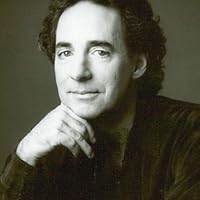Absolute Quotes
Quotes tagged as "absolute"
Showing 1-30 of 653

“The man who refuses to judge, who neither agrees nor disagrees, who declares that there are no absolutes and believes that he escapes responsibility, is the man responsible for all the blood that is now spilled in the world. Reality is an absolute, existence is an absolute, a speck of dust is an absolute and so is a human life. Whether you live or die is an absolute. Whether you have a piece of bread or not, is an absolute. Whether you eat your bread or see it vanish into a looter's stomach, is an absolute.
There are two sides to every issue: one side is right and the other is wrong, but the middle is always evil. The man who is wrong still retains some respect for truth, if only by accepting the responsibility of choice. But the man in the middle is the knave who blanks out the truth in order to pretend that no choice or values exist, who is willing to sit out the course of any battle, willing to cash in on the blood of the innocent or to crawl on his belly to the guilty, who dispenses justice by condemning both the robber and the robbed to jail, who solves conflicts by ordering the thinker and the fool to meet each other halfway. In any compromise between food and poison, it is only death that can win. In any compromise between good and evil, it is only evil that can profit. In that transfusion of blood which drains the good to feed the evil, the compromise is the transmitting rubber tube.”
― Atlas Shrugged
There are two sides to every issue: one side is right and the other is wrong, but the middle is always evil. The man who is wrong still retains some respect for truth, if only by accepting the responsibility of choice. But the man in the middle is the knave who blanks out the truth in order to pretend that no choice or values exist, who is willing to sit out the course of any battle, willing to cash in on the blood of the innocent or to crawl on his belly to the guilty, who dispenses justice by condemning both the robber and the robbed to jail, who solves conflicts by ordering the thinker and the fool to meet each other halfway. In any compromise between food and poison, it is only death that can win. In any compromise between good and evil, it is only evil that can profit. In that transfusion of blood which drains the good to feed the evil, the compromise is the transmitting rubber tube.”
― Atlas Shrugged
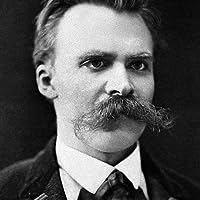
“Objection, evasion, joyous distrust, and love of irony are signs of health; everything absolute belongs to pathology.”
― Beyond Good and Evil
― Beyond Good and Evil
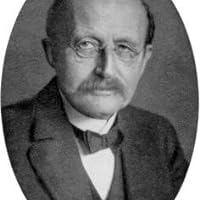
“The assumption of an absolute determinism is the essential foundation of every scientific enquiry.”
― Dilemmas of an Upright Man: Max Planck and the Fortunes of German Science
― Dilemmas of an Upright Man: Max Planck and the Fortunes of German Science
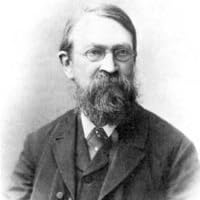
“But we must not forget that all things in the world are connected with one another and depend on one another, and that we ourselves and all our thoughts are also a part of nature. It is utterly beyond our power to measure the changes of things by time. Quite the contrary, time is an abstraction, at which we arrive by means of the change of things; made because we are not restricted to any one definite measure, all being interconnected. A motion is termed uniform in which equal increments of space described correspond to equal increments of space described by some motion with which we form a comparison, as the rotation of the earth. A motion may, with respect to another motion, be uniform. But the question whether a motion is in itself uniform, is senseless. With just as little justice, also, may we speak of an “absolute time” --- of a time independent of change. This absolute time can be measured by comparison with no motion; it has therefore neither a practical nor a scientific value; and no one is justified in saying that he knows aught about it. It is an idle metaphysical conception.”
― Science of Mechanics
― Science of Mechanics
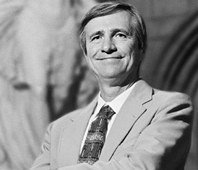
“It is reasonable to love the Absolute absolutely for the same reason it is reasonable to love the relative relatively.”
― Jesus-Shock
― Jesus-Shock
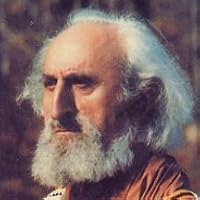
“Relativism reduces every element of absoluteness to relativity while making a completely illogical exception in favor of this reduction itself. Fundamentally it consists in propounding the claim that there is no truth as if this were truth or in declaring it to be absolutely true that there is nothing but the relatively true; one might just as well say that there is no language or write that there is no writing. In short, every idea is reduced to a relativity of some sort, whether psychological, historical, or social; but the assertion nullifies itself by the fact that it too presents itself as a psychological, historical, or social relativity. The assertion nullifies itself if it is true and by nullifying itself logically proves thereby that it is false; its initial absurdity lies in the implicit claim to be unique in escaping, as if by enchantment, from a relativity that is declared to be the only possibility.”
― Logic & Transcendence
― Logic & Transcendence
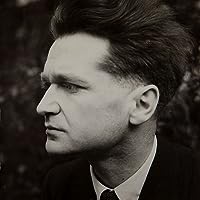
“Magnificat de Bach. Remué jusqu'aux larmes. Il est impossible que ce qui s'y exprime n'ait qu'une réalité subjective. L'« âme » doit être de la même essence que l'absolu. Et c'est le Vedânta qui a raison.”
― Notebooks
― Notebooks
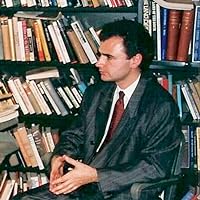
“Absolute is a game with only one player where Absolute forgets itself so it would have a reason to fulfill the motion while returning.”
― The Sun Watches the Sun
― The Sun Watches the Sun
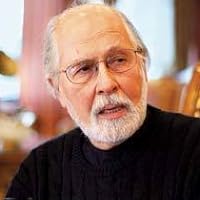
“We, that is, the traditionalists like myself, use the term ‘‘modernism’’ not in a vague way as characterizing just things that happen to be around today, but as a particular way of looking at the world, a worldview that began in the Renaissance in the West with such components as Renaissance humanism, rationalism, et cetera. As I have mentioned already, modernism rejects the primacy of absolute and ultimate truth transcending the human order and descend- ing upon the human realm from the Divine Order. It places man himself at the center of the stage as ‘‘the absolute.’’ In a sense it absolutizes the human being in his or her earthly reality. Usually it does not come out and say so explicitly, but that is what it really means; that is, it takes the absolute away from God and puts it on the human plane, and therefore makes human reason, human perceptions, human interests the criteria of reality, of knowledge, of the truth, of the goal of human life. Therefore, as a consequence it substitutes the significance of the temporal and the transient for the abiding and the eternal.”
― در جستوجوی امر قدسي
― در جستوجوی امر قدسي

“Many concepts and ideas become laws in time, like the laws of physics. In time, many of these same concepts lose validity in favor of new concepts that become new laws. These phenomena lead to the progress of science; otherwise, some concepts, which were previously laws, would always stay the same regardless of whether they were correct.”
― ABSOLUTE
― ABSOLUTE

“New concepts or laws would not be possible without the preceding concepts or laws. What we refuse today as incorrect is the basis for something we accept as correct tomorrow. Then the question arises—if the preceding concept was incorrect, how is it possible that the new concept, or law, that we think is correct can be based on the previous and rejected one? Something “incorrect” cannot be the basis for something correct. In this way, we conclude that even those laws (concepts) we reject today as incorrect contain the elements of a new law or concept or something that we think is correct or more correct. The world's universal nature cannot be wholly apprehended and observed by the human mind. All this happens while the laws stay the same; only our ideas and concepts about the laws change, not the laws or the truth (fact) itself.”
― ABSOLUTE
― ABSOLUTE

“Nothing in the world can be absolute except the Absolute itself. Everything else is contained and exists in relations. Relations can exist only through the division of the Absolute or God. Since no part is absolute, then no part can completely understand (including the human mind) or comprehend the whole of the Absolute. Understanding the “final” laws leads toward the end.
If humans understood and empowered themselves with the knowledge of these laws, they would cease to be humans and become what they sought to find or understand. In that way, humans become either God or nothing. The ultimate beauty is the evolution of the world. Evolution in the animal world (individual species) can be horizontal without major changes. Still, in the development of humans, it can be pretty vertical (thanks to awareness and brain power). Regardless of the vertical evolution of humans as biological beings, this is still only evolution, and evolution is only possible if something new is acquired, for the lack of final knowledge, about the final causes and the ultimate essence of being.”
― ABSOLUTE
If humans understood and empowered themselves with the knowledge of these laws, they would cease to be humans and become what they sought to find or understand. In that way, humans become either God or nothing. The ultimate beauty is the evolution of the world. Evolution in the animal world (individual species) can be horizontal without major changes. Still, in the development of humans, it can be pretty vertical (thanks to awareness and brain power). Regardless of the vertical evolution of humans as biological beings, this is still only evolution, and evolution is only possible if something new is acquired, for the lack of final knowledge, about the final causes and the ultimate essence of being.”
― ABSOLUTE

“That which we never question is the concept itself. But what is a concept? Is it necessary to put the idea of a concept itself, or the law, under the magnifying glass to better understand it because a concept is only a word or term it expresses? Even the concept itself, as an idea or term, can be a matter of discussion or scientific, philosophical, artistic, or religious discourse. Consequently, we may discover that something that slowed down the development of ideas and their formulations or understanding of laws is the impossibility of breaking up with concepts or paradigms that became a priori truths.”
― ABSOLUTE
― ABSOLUTE

“God is a concept more than anything else. The idea of God or about God, as it functions in religions, doesn’t deal with reality but with presuppositions based on revelations. Revelation, in itself, is arbitrary and can result from hallucination, among other things, which does not exclude the possibility that even hallucination may lead to some ways of truth.”
― ABSOLUTE
― ABSOLUTE

“From the point of established religions, God is conceptually the source of the world, something that creates the world but stays beyond the world as something absolute that influences the world. Not only is God understood in this way, but it is also appropriated in the main monotheistic religions. Therefore, from the standpoint of official religions, it is much more important to claim God understood in this manner and establish the right to God than the God itself (accurate idea and concept of God). That is how this strange ownership functions and obtains “legitimacy.”
― ABSOLUTE
― ABSOLUTE

“Divine Hiddenness Argument against God’s Existence
Divine Hiddenness does not necessarily mean that the Ultimate Being hides; it instead means that our human powers are limited. The natural laws were secret (and still are) to the people before they learned to decipher them slowly. We may say that Newton's laws deciphered and formulated were hidden up to that point not because they were hiding per se but because our abilities were not on par with the laws of physics, which we have thought were “hidden.” It is a poor argument to use hiddenness as a legitimate argument against God or against anything else, of which, at some point, we do not have a proper or complete understanding.
Hiddenness by itself is not proof that God does not exist. By using that logic, we may say that mosquitos are not aware of the existence of human beings. The argument that they are very “aware,” in some sense while sucking the blood of humans would not be sufficient because they are not aware of who and what human beings are. Certainly, microorganisms, without any desire to compare human beings with microorganisms, are not aware of the existence of human beings.
What if animals used an argument, if they could, that there is no evidence that there are many galaxies in the Universe, or if any other animal could have used that argument? Would that be proof that other galaxies do not exist? On what basis are we sure that we possess the ability to experience God directly if it existed (although the world is one of the faces of God)?
I am not trying to compare human beings to other animals or diminish human abilities. Still, I would like to emphasize that, regardless of how advanced we are, we may still be as distant from God, or more, as some animals are from us. To rely only on evidence is to limit the science, not to be scientific. What is scientific in limiting science to the frame that fits our capacity for understanding, learning, and comprehension instead of fitting the frame of reality and the truth?
To be precise, we would need to redefine or make the idea of God more precise. Maybe God is not what we think it is. What if the World itself is God? What if the World, regardless of its beginning and end, is still a consequence of an eternal Being without a beginning and end? What if the world and matter as we know it are only the modes of the Universal Eternal Being from which everything originates and to which everything returns?
Matter is not what we think it is. God is not what religious books say. Nobody has the right to God, a title to God. No prophet can tell other people that he (or she) speaks the word of God. Humans do the things done in the name of God in their name, not the name of God. Their hiding behind God is a form of manipulation, demagogy, and control of others.”
― ABSOLUTE
Divine Hiddenness does not necessarily mean that the Ultimate Being hides; it instead means that our human powers are limited. The natural laws were secret (and still are) to the people before they learned to decipher them slowly. We may say that Newton's laws deciphered and formulated were hidden up to that point not because they were hiding per se but because our abilities were not on par with the laws of physics, which we have thought were “hidden.” It is a poor argument to use hiddenness as a legitimate argument against God or against anything else, of which, at some point, we do not have a proper or complete understanding.
Hiddenness by itself is not proof that God does not exist. By using that logic, we may say that mosquitos are not aware of the existence of human beings. The argument that they are very “aware,” in some sense while sucking the blood of humans would not be sufficient because they are not aware of who and what human beings are. Certainly, microorganisms, without any desire to compare human beings with microorganisms, are not aware of the existence of human beings.
What if animals used an argument, if they could, that there is no evidence that there are many galaxies in the Universe, or if any other animal could have used that argument? Would that be proof that other galaxies do not exist? On what basis are we sure that we possess the ability to experience God directly if it existed (although the world is one of the faces of God)?
I am not trying to compare human beings to other animals or diminish human abilities. Still, I would like to emphasize that, regardless of how advanced we are, we may still be as distant from God, or more, as some animals are from us. To rely only on evidence is to limit the science, not to be scientific. What is scientific in limiting science to the frame that fits our capacity for understanding, learning, and comprehension instead of fitting the frame of reality and the truth?
To be precise, we would need to redefine or make the idea of God more precise. Maybe God is not what we think it is. What if the World itself is God? What if the World, regardless of its beginning and end, is still a consequence of an eternal Being without a beginning and end? What if the world and matter as we know it are only the modes of the Universal Eternal Being from which everything originates and to which everything returns?
Matter is not what we think it is. God is not what religious books say. Nobody has the right to God, a title to God. No prophet can tell other people that he (or she) speaks the word of God. Humans do the things done in the name of God in their name, not the name of God. Their hiding behind God is a form of manipulation, demagogy, and control of others.”
― ABSOLUTE

“Russell’s Teapot (Celestial Teapot Analogy)
We cannot equate Russell’s teapot idea with the idea of God.
Although this idea is humorous, it isn't very sensible. If anybody without scientific credentials stated seriously that the teapot is circling the sun, the majority of people would think that a person stating that is either bipolar, schizophrenic, or suffers from some other mental illness. This kind of comparison is absurd. Comic and absurdist comparisons of this kind only muddy the waters. Proof or disproof of such a thing is unnecessary because almost everybody knows the teapot can't orbit the sun as freely as planets on a microcosmic or macro level. Regardless of Russel being aware that his example is nonsense, he still used it (and he states that). The point was not to prove anything but to make a funny remark to diminish the subject of the attack, God. It is a logical fallacy whenever we use such tactics or tricks because we use witty comments for lacking something more potent. If we make fun of some ideas, it does not mean they have no value. We cannot destroy an idea that has existed for millennia by witty but silly arguments.
Carl Sagan made an even sillier argument about the undetectable dragon in his garage. To compare the idea of God to the teapot or a dragon in a garage is a useless way to refute an idea or argument with an “argument” (example) in the form of funny irony.
I must emphasize that I admire Bertrand Russel and Carl Sagan for their ingenuity and insights. I also admire Bertrand Russell’s writing style because he could express complicated ideas and concepts in very readable and clear prose.
There can be no comparison between the idea of God and a teapot floating around the Sun or between God and an unidentifiable dragon in the garage. We cannot base our arguments on the value of their wittiness because regardless of how witty the statement is, it has to stand the test of truth, not the test of wittiness. We can easily exclude the idea of a teapot floating in orbit around the sun as ridiculous. The same applies to the argument about the dragon in a garage. But can we exclude the idea of God from religious and theological thoughts and serious philosophical inquiries interested in discovering the truth about the world and God? We can easily refuse to accept a teapot or dragon in the garage arguments as serious arguments. However, we cannot a priori deny the legitimacy of the idea about God, at least not the deist one (or pantheistic).”
― ABSOLUTE
We cannot equate Russell’s teapot idea with the idea of God.
Although this idea is humorous, it isn't very sensible. If anybody without scientific credentials stated seriously that the teapot is circling the sun, the majority of people would think that a person stating that is either bipolar, schizophrenic, or suffers from some other mental illness. This kind of comparison is absurd. Comic and absurdist comparisons of this kind only muddy the waters. Proof or disproof of such a thing is unnecessary because almost everybody knows the teapot can't orbit the sun as freely as planets on a microcosmic or macro level. Regardless of Russel being aware that his example is nonsense, he still used it (and he states that). The point was not to prove anything but to make a funny remark to diminish the subject of the attack, God. It is a logical fallacy whenever we use such tactics or tricks because we use witty comments for lacking something more potent. If we make fun of some ideas, it does not mean they have no value. We cannot destroy an idea that has existed for millennia by witty but silly arguments.
Carl Sagan made an even sillier argument about the undetectable dragon in his garage. To compare the idea of God to the teapot or a dragon in a garage is a useless way to refute an idea or argument with an “argument” (example) in the form of funny irony.
I must emphasize that I admire Bertrand Russel and Carl Sagan for their ingenuity and insights. I also admire Bertrand Russell’s writing style because he could express complicated ideas and concepts in very readable and clear prose.
There can be no comparison between the idea of God and a teapot floating around the Sun or between God and an unidentifiable dragon in the garage. We cannot base our arguments on the value of their wittiness because regardless of how witty the statement is, it has to stand the test of truth, not the test of wittiness. We can easily exclude the idea of a teapot floating in orbit around the sun as ridiculous. The same applies to the argument about the dragon in a garage. But can we exclude the idea of God from religious and theological thoughts and serious philosophical inquiries interested in discovering the truth about the world and God? We can easily refuse to accept a teapot or dragon in the garage arguments as serious arguments. However, we cannot a priori deny the legitimacy of the idea about God, at least not the deist one (or pantheistic).”
― ABSOLUTE

“We must admit that we do not know everything about our world. What we know is not all that we can learn. We do not even know how much we do not know and how huge the difference between what we know and what we do not know is. We do not understand quantum mechanics in a real sense. We do not realize what gravitation is. We do not know if there is only one universe that we think originated from a Big Bang or if there are many other universes. We do not know what dark matter is, and we do not know what dark energy is, nor do we exactly understand these phenomena.”
― ABSOLUTE
― ABSOLUTE

“We cannot say that what we don’t understand about the universe or what we do not know about the universe does not exist. Our ignorance about the myriad of unknown and outstanding issues does not mean that these issues are teapots orbiting the sun or dragons or spirits hiding in our garages, apartments, or homes. There is only one home we all inhabit. That home is this universe, this world we live in. We learned much about our home but constantly pursued discoveries and new knowledge to bring us closer to the stars and the core of everything. That core of everything that we all crave hides beyond our cognitive abilities and shifts away again and again, regardless of our progress and discoveries. Are we closer to the truth today than Plato was almost 2,500 years ago?”
― ABSOLUTE
― ABSOLUTE

“Where is the core of the truth? If the center of the truth is out of space and time, then we cannot think about it from the paradigm of space and time. First, we have to define, as much as possible, the meaning of the word (term) God. What do we mean when we use the term God in every situation? We also must ask why God must be what some people say in the religious books. Why the Creator cannot be One with his creation? Why can’t we assume that the World is God in action? The Source of everything is not only the Source but also the Materialization and Personification of itself through the world. Maker is the making and the creation of the making. Without making, the Maker is dead. Making and creating is the rejuvenation of the Maker. The world is another face of the Maker. The world is a way out. The World is God’s exit strategy. The world is the salvation of the maker. Creation is the salvation of the Creator through its creation. Since the world itself is the source, the world is also uncreated. The world did not come out of nothing, ex nihilo. The world is one of the manifestations of the Absolute. The world is proof that the Absolute exists.”
― ABSOLUTE
― ABSOLUTE

“What we do not understand about the world or the things “beyond” the world is not proof that they do not exist but proof of our ignorance. Our ignorance cannot be a measure of anything and should not be a measure of anything, not to mention that it cannot be a measure of the unknown in this world or about what we think is beyond our world. Is something within or beyond only a matter of our understanding and perception rather than necessarily a matter of fact? The world is physics and metaphysics at the same time. Although it sounds paradoxical, we are what we are and are not. The world is more what we do not understand than we know. We seek what is seeking us. The Source is singing the song through all of us. The song of the universe celebrates the existence, the voyage, and the plurality dispersed through almost “eternity” to seek and reach the light that is the reflection of itself because the light of the source is in every one of us. To find the light within is to find the light out. Finding the source is identifying with the source on the way back to the source itself. The world is one organism. Existence needs separations to create and maintain life.”
― ABSOLUTE
― ABSOLUTE

“COSMOLOGICAL ARGUMENT
The First Cause Argument
The real problem with the first cause argument is not if God or anything else needed a cause but if the first cause is necessary for anything. If the Ultimate Being, or Absolute, always existed, nothing else exists or can exist outside of it except a transformation, “creation,” or recreation within the Absolute. Absolute Being is not the first cause of the world. We must agree with Russel that the world is without a cause. The view that the Absolute (in someone’s eyes, God) is without a cause does not mean that the world had a different, specific cause. The world is the Absolute itself or emanation of it. The world is the life of the Absolute (or God, but not a God from religious books), not something “different” from the Absolute. Therefore, neither the Absolute, God, Nothingness, nor the Universe need a cause because they are all the Absolute itself. Absolute is the causeless cause operating within itself. The world is a manifestation of the Absolute and its celebration, lovemaking between the Being and Nonbeing in the form of the cosmic fireworks for the hidden eyes of the Absolute. The World is a causeless cause's transformation, creation, or Recreation.
The Nothingness and the Being or Something are eternal and, therefore, are without a cause. The real question for atheists is how something can appear out of nothing at some point. Believing that something can come out from nothing is way less believable than the idea that there is an eternal Being that does not need a cause. We may call it whatever name we choose, but it is not necessarily incompatible with science. The limitations of science and its limited outreach cannot serve as proof against the eternal source of everything. Limitations are only proof of the level of science at some point. There is no absolute knowledge, and we can say, with almost absolute certainty, that humans cannot acquire absolute knowledge. Even if this were possible, humans would no longer be humans but be something else.”
― ABSOLUTE
The First Cause Argument
The real problem with the first cause argument is not if God or anything else needed a cause but if the first cause is necessary for anything. If the Ultimate Being, or Absolute, always existed, nothing else exists or can exist outside of it except a transformation, “creation,” or recreation within the Absolute. Absolute Being is not the first cause of the world. We must agree with Russel that the world is without a cause. The view that the Absolute (in someone’s eyes, God) is without a cause does not mean that the world had a different, specific cause. The world is the Absolute itself or emanation of it. The world is the life of the Absolute (or God, but not a God from religious books), not something “different” from the Absolute. Therefore, neither the Absolute, God, Nothingness, nor the Universe need a cause because they are all the Absolute itself. Absolute is the causeless cause operating within itself. The world is a manifestation of the Absolute and its celebration, lovemaking between the Being and Nonbeing in the form of the cosmic fireworks for the hidden eyes of the Absolute. The World is a causeless cause's transformation, creation, or Recreation.
The Nothingness and the Being or Something are eternal and, therefore, are without a cause. The real question for atheists is how something can appear out of nothing at some point. Believing that something can come out from nothing is way less believable than the idea that there is an eternal Being that does not need a cause. We may call it whatever name we choose, but it is not necessarily incompatible with science. The limitations of science and its limited outreach cannot serve as proof against the eternal source of everything. Limitations are only proof of the level of science at some point. There is no absolute knowledge, and we can say, with almost absolute certainty, that humans cannot acquire absolute knowledge. Even if this were possible, humans would no longer be humans but be something else.”
― ABSOLUTE

“The Natural Law Argument
Bertrand Russell: “There is, as we all know, a law that if you throw dice, you will get double sixes only about once in thirty-six times, and we do not regard that as evidence that the fall of the dice is regulated by design.”
Russell's argument is a logical fallacy because we cannot impose our understanding and interpretation of playing dice on God or the natural law. We must first define or understand our subject to talk about anything with scientific precision. Since nobody has an understanding of the world before the world, to put it that way, we cannot have a clear understanding or grasp of the things that are beyond our cognitive powers. We still can think about them. To say that science is only what is proven by scientific experiments would be foolish because that would exclude the vast space of the unknown, even unknowable. Maybe God does not play dice, but maybe even God needs, metaphorically speaking, to throw out thirty-six worlds to make some effects, even if only two, that would otherwise not be possible. As we know, matter cannot power itself and organize itself without the underlying creative force empowering it. Matter is matter thanks to our perceptive and cognitive powers, not per se. Matter per se does not exist in the form we see it. What we see is a reality based on our senses. We cannot completely rely on our senses to tell the underlying reality. Reaching the underlying reality is possible only through abstract thought. This abstract thought will enhance scientific discoveries because we cannot reach the physically unreachable by experiments or strictly scientific means.
Identification of God from religious books with God independent of holy books is prevalent in the books or arguments against God used by the most famous atheists, including agnostics like Bertrand Russell. However, a huge difference exists between a God from religious books and Spinoza’s God or the God of many philosophers and scientists. Once we acknowledge and accept this important difference, we will realize that the gap between believers (not contaminated by religions) and atheists (or agnostics) is much smaller than it looks at first sight. God is not in the religious books, nor can he be owned through religious books. The main goal of the major monotheistic religions is to a priori appropriate and establish the right to God rather than to define and explain God in the deepest possible sense because that is almost impossible, even for science and philosophy. For that reason, a belief in blind faith and fear mostly saves major religions, rather than pure belief, unaffected by religious influence or deceit.”
―
Bertrand Russell: “There is, as we all know, a law that if you throw dice, you will get double sixes only about once in thirty-six times, and we do not regard that as evidence that the fall of the dice is regulated by design.”
Russell's argument is a logical fallacy because we cannot impose our understanding and interpretation of playing dice on God or the natural law. We must first define or understand our subject to talk about anything with scientific precision. Since nobody has an understanding of the world before the world, to put it that way, we cannot have a clear understanding or grasp of the things that are beyond our cognitive powers. We still can think about them. To say that science is only what is proven by scientific experiments would be foolish because that would exclude the vast space of the unknown, even unknowable. Maybe God does not play dice, but maybe even God needs, metaphorically speaking, to throw out thirty-six worlds to make some effects, even if only two, that would otherwise not be possible. As we know, matter cannot power itself and organize itself without the underlying creative force empowering it. Matter is matter thanks to our perceptive and cognitive powers, not per se. Matter per se does not exist in the form we see it. What we see is a reality based on our senses. We cannot completely rely on our senses to tell the underlying reality. Reaching the underlying reality is possible only through abstract thought. This abstract thought will enhance scientific discoveries because we cannot reach the physically unreachable by experiments or strictly scientific means.
Identification of God from religious books with God independent of holy books is prevalent in the books or arguments against God used by the most famous atheists, including agnostics like Bertrand Russell. However, a huge difference exists between a God from religious books and Spinoza’s God or the God of many philosophers and scientists. Once we acknowledge and accept this important difference, we will realize that the gap between believers (not contaminated by religions) and atheists (or agnostics) is much smaller than it looks at first sight. God is not in the religious books, nor can he be owned through religious books. The main goal of the major monotheistic religions is to a priori appropriate and establish the right to God rather than to define and explain God in the deepest possible sense because that is almost impossible, even for science and philosophy. For that reason, a belief in blind faith and fear mostly saves major religions, rather than pure belief, unaffected by religious influence or deceit.”
―

“The Argument from Design
Based on Russell's treatment of this argument, we assume that Russel expected that the world's creation, by design, had to be perfect. But, as with all other arguments, we must establish what design and perfection mean. If we do not clearly define what design is and what perfection is, we are applying our judgments to something either undefined or loosely defined. Evolutionary theory, be it Darwin’s theory, cannot be proof of a bad design of the world. Anomalies or shortages in the world are not proof of a bad design. Imperfections are needed in the world and serve a higher purpose. Let’s say that God if he existed, wanted to create the perfect world. This perfect world would be sterile. In the perfect world, there would be no cosmic hierarchies, lows, and highs, enough friction to sustain life as something whose purpose is not to be made perfect from the beginning but to seek perfection, to make “progress” in myriad ways toward the main purpose which is life itself. Life, by definition, is not perfect. Perfect life is not a real life.
The purpose of design is not to predict a Ku Klux Klan or the fascists and eliminate them from the design before any creation but to put the “engine” of the vast Universe in motion, to enable the world to seek its paths freely, without a God playing dice. That is where determinism and free will come together to create a sensible world.
Design does not mean playing dice, nor necessarily creating something new, but the creator offers himself an exit to exist in an ever-new world, a new form with meaning. We also may say that in the Universe or Omniverse, beyond our knowledge, there can be not only thirty-six (to make a comparison with dice) but a googolplex of universes (dice), and the possibility for combinations is infinite.
“Impossibility to prove God” is not proof that God does not exist. Russel would argue that the burden of proof is on the person making a claim, but the world itself is proof of God’s existence. The solution to this enigma is to recognize that the world is God. The problem is not belief or disbelief, first cause, natural law or good or bad design, or any other argument for the existence or against the existence of God; the problem is in our understanding and consensus about the idea of what God is. Argumentation or proof can never be shifted to only one side. Something so obvious as the world does not need proof but understanding that the world is also, in its deepest nature, God itself.
We can fight as long as we want, but if we fight from different positions for the sake of different positions, we are not going anywhere. God is not the same for the theist or the deist. Christian God is so far from Spinoza’s idea about God. The majority of people who are atheists today are atheists more in revolt against nominal, official religions and not necessarily in revolt against God if this God was better defined or approached from an angle unaffected by religions.”
― ABSOLUTE
Based on Russell's treatment of this argument, we assume that Russel expected that the world's creation, by design, had to be perfect. But, as with all other arguments, we must establish what design and perfection mean. If we do not clearly define what design is and what perfection is, we are applying our judgments to something either undefined or loosely defined. Evolutionary theory, be it Darwin’s theory, cannot be proof of a bad design of the world. Anomalies or shortages in the world are not proof of a bad design. Imperfections are needed in the world and serve a higher purpose. Let’s say that God if he existed, wanted to create the perfect world. This perfect world would be sterile. In the perfect world, there would be no cosmic hierarchies, lows, and highs, enough friction to sustain life as something whose purpose is not to be made perfect from the beginning but to seek perfection, to make “progress” in myriad ways toward the main purpose which is life itself. Life, by definition, is not perfect. Perfect life is not a real life.
The purpose of design is not to predict a Ku Klux Klan or the fascists and eliminate them from the design before any creation but to put the “engine” of the vast Universe in motion, to enable the world to seek its paths freely, without a God playing dice. That is where determinism and free will come together to create a sensible world.
Design does not mean playing dice, nor necessarily creating something new, but the creator offers himself an exit to exist in an ever-new world, a new form with meaning. We also may say that in the Universe or Omniverse, beyond our knowledge, there can be not only thirty-six (to make a comparison with dice) but a googolplex of universes (dice), and the possibility for combinations is infinite.
“Impossibility to prove God” is not proof that God does not exist. Russel would argue that the burden of proof is on the person making a claim, but the world itself is proof of God’s existence. The solution to this enigma is to recognize that the world is God. The problem is not belief or disbelief, first cause, natural law or good or bad design, or any other argument for the existence or against the existence of God; the problem is in our understanding and consensus about the idea of what God is. Argumentation or proof can never be shifted to only one side. Something so obvious as the world does not need proof but understanding that the world is also, in its deepest nature, God itself.
We can fight as long as we want, but if we fight from different positions for the sake of different positions, we are not going anywhere. God is not the same for the theist or the deist. Christian God is so far from Spinoza’s idea about God. The majority of people who are atheists today are atheists more in revolt against nominal, official religions and not necessarily in revolt against God if this God was better defined or approached from an angle unaffected by religions.”
― ABSOLUTE
All Quotes
|
My Quotes
|
Add A Quote
Browse By Tag
- Love Quotes 97.5k
- Life Quotes 76k
- Inspirational Quotes 73k
- Humor Quotes 43.5k
- Philosophy Quotes 29.5k
- Inspirational Quotes Quotes 27k
- God Quotes 26k
- Truth Quotes 23.5k
- Wisdom Quotes 23.5k
- Romance Quotes 23k
- Poetry Quotes 22k
- Death Quotes 20k
- Happiness Quotes 18.5k
- Life Lessons Quotes 18.5k
- Hope Quotes 18k
- Faith Quotes 18k
- Quotes Quotes 16.5k
- Inspiration Quotes 16.5k
- Spirituality Quotes 15k
- Religion Quotes 15k
- Motivational Quotes 15k
- Writing Quotes 15k
- Relationships Quotes 14.5k
- Life Quotes Quotes 14k
- Love Quotes Quotes 14k
- Success Quotes 13.5k
- Time Quotes 12.5k
- Motivation Quotes 12k
- Science Quotes 11.5k
- Motivational Quotes Quotes 11.5k

